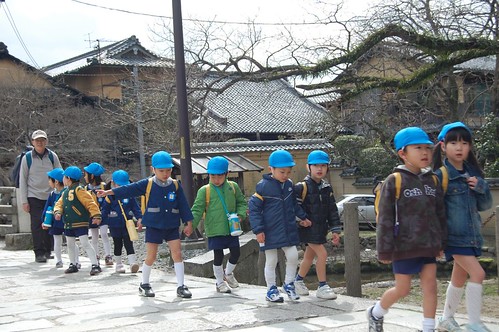1.) Learning from podcast project:
-I think that the experience of performing in Japanese will add something new to what I've already done. Though some people memorized scripts for their oral tests last semester, I did not (we just had an outline). This means that I will be memorizing Japanese to the point where I am *hopefully* relatively fluent. In my Chinese class we recite our essays to the class, in order to experience a similar sort of fluent speech. This is seen as distinct from reading out loud, distinct from on-the-spot communication. Though I also think-hope that it will add to the humor factor of the podcast (i.e. if we are somehow really good, it may be interesting for the audience to experience 1st year students with this performance, and if we are bad hopefully we are comprehensible in which case a humorous element may also be present).
-I also think that writing a script will be good practice writing dialogue or oral speech. Not all of the compositions will include this aspect (e.g. they probably won't have そうですね or other similar feedback type communication). Additionally, I am sure I will learn a lot more about grammar or at least reinforce what we have learned by this. It is a great opportunity to push our Japanese use to its limit.
-Another (somewhat tongue-in-cheek) expectation is that I will learn just how much effort goes into podcasts and video podcasts. As a consumer of these media, I often don't consider the time put into their production. This one was pretty fun sometimes for example.
-Other than causing me to spend more time focusing on the Japanese skill set that I have, I can't say that I am sure how this will improve my "autonomous" Japanese learning. What do other people think that our teachers mean by "autonomous" learning? I suppose it means the ways in which we learn on our own. Perhaps there is just something a touch ironic about the idea of "autonomous" learning in language study given that language is about communication. It can fairly easily be argued that even reading books or writing a diary are forms of interaction with others....but this is leading me to the next question.
2.) Communication
Our discussion drew a distinction between communication and talking. Communication involves efforts toward sharing something deeper. I guess in language study, often times we practice grammar by just talking but don't necessarily communicate. Communication happens when something (idea, fact, desire) is *successfully* transferred to another entity (could be a non-human, but there is definitely more than one being involved).
This evokes all the beauty and strangeness that language comprises (esp. written language): these strange series of sounds, things representing sounds, or things kinda representing meaning/sound (aka 漢字) somehow end up being "understood" by another as carrying some sort of meaning. What an amazing practice of abstraction. And just try to imagine a world without this.
Though this also makes me think of the fact that there are other flavors of communication, it is not restricted to oral or written. There are all sorts of physical language and communication (which goes further to argue that the players don't have to be human). In fact, this sort of communication is at the level of instinct, e.g. facial expressions naturally arise in certain situations.
 This question of communication in relation to the podcast is a good reminder that the visual and audio queues from our podcasts will not just be limited to oral or written language. The music, background, costumes, and physical gesture will all be part of the communication.
This question of communication in relation to the podcast is a good reminder that the visual and audio queues from our podcasts will not just be limited to oral or written language. The music, background, costumes, and physical gesture will all be part of the communication.

0 comments:
Post a Comment